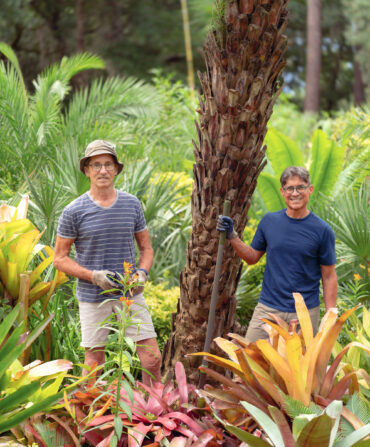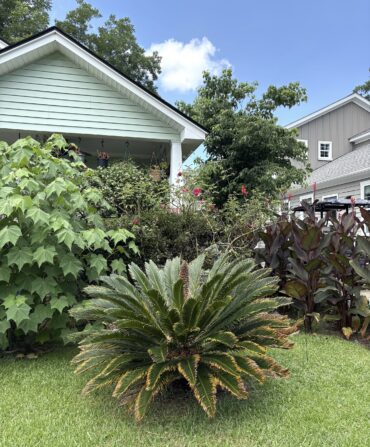Do we have to kill all the snakes that come around?
This time of year, if you’re not seeing a snake a day, you need to get out more. We very much hope you don’t run for the hoe and murder everything, though, because, in a word: kings. King snakes and other nonvipers bring you the gift of their essential links in the food chain. You want that elegant balance in the garden. So before we address whether to kill any of the South’s fearsomely beautiful vipers and its one gaudy elapid, the reclusive coral, let’s tip our hat to kings. At a maximum of six-plus feet, they might seem threatening. But kings are immune to pit-viper venom, so in addition to the field mice in their diet, they also happily kill and eat rattlers, copperheads, and water moccasins. You want that, too. As for our Viperidae brethren, seeing a water moccasin glide by does not merit a response akin to battling up the hill at Iwo Jima. I’m not suggesting you become a snake hugger, and certainly, sometimes a cornered rattler leaves you zero choice but to grab the pistol. Most of the time, the snake will give you options. Flight can be smarter than fight—for obvious reasons. The South has plenty of good gator and snake trappers. Take the time to get to know one, before you have to figure out whether that shot you’re about to take with the .410 at the copperhead hissing in the back corner of your bedroom will rip Grandmomma’s chifforobe beyond repair.
What the hell is blackberry acid?
Turns out the ancestors were right about a few things, among them the tactics of summertime refreshment. Blackberry acid is exactly what it sounds like: the fruit, reduced, plus tartaric acid. Tartaric acid, winemaking’s signature by-product, often gets cut with potassium hydroxide to become the baker’s tool, cream of tartar, or, as my farm-girl grandmother, Minnie, macerated the words in her South Alabama brogue, creemah-TAH-tuh. Our receipt comes from Minnie’s mother, Sallie Perkins Holman, who got it way upstream. So: In a large nonreactive container, pour two-thirds of a gallon of boiling water over each gallon of blackberries, cover, and let stand for twenty-four hours. Strain, and discard the fruit. Heat the juice slowly, stirring in sugar. Caveat: Great-Grandmother Sallie recommends a terrifying ratio of a cup of sugar to each pint of liquid. Dial that way back. Your goal here is tart, not sweet. Stir in two to three tablespoons of tartaric acid, or double that measure of cream of tartar. Chill, cover but don’t seal, and store in the refrigerator. The culinary thought behind blackberry acid was to deliver the fruit’s bracing essence in a nectar that, with cold spring water or seltzer, would power a lawn party, a luncheon, or a long afternoon with the horses.
Is it possible to live without AC and not go mad?
Entirely. Having said that, I could argue that every last one of my numerous pre-air-conditioning ancestors was, to a man, a stark raving maniac. In their cases, their dogged collective otherness had nothing to do with the South’s signature heat. From the moment they arrived in the country and made a crop, it was the other way around: The South’s heat was simply the proscenium on which their madness best paraded itself. The way we know this is that, 118 years on from Willis Haviland Carrier’s invention of modern air-conditioning in 1902, my family is exactly the same kinda crazy as they were in 1699. Most of American history was well and extravagantly lived before Carrier took the idea of cooling to the personal level. Are there tricks? You bet. Invest in porch swings and ceiling fans. Train vines in a white lattice to block out the sun. Eat a cold, ripe tomato as you would an apple. Harness the prevailing breeze in any structure you have a hand in building. Marvel at the sweat beading on your glass of iced tea. Open the lowest and the highest windows in your house, as firefighters do when ventilating a structure of smoke. Walk a horse down a shady dirt road. Chew a sprig of fresh mint. Swim. But mainly: Be outside. Revel in the heat and take in its many lessons, the main one of which will be, don’t stop doing anything, ever, for such a paltry reason as that one.
Have a burning question? Email us.
This article appears in the June/July 2020 issue of Garden & Gun. Start your subscription here or give a gift subscription here.








